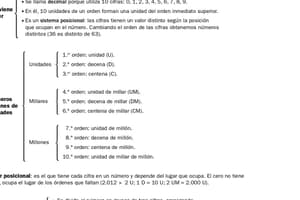Podcast
Questions and Answers
What is the value of the digit 7 in the number 42.789?
What is the value of the digit 7 in the number 42.789?
- 0.07
- 7
- 0.7 (correct)
- 70
In multiplying the numbers 3.4 and 2.5, how many total decimal places are in the product?
In multiplying the numbers 3.4 and 2.5, how many total decimal places are in the product?
- 3
- 2 (correct)
- 1
- 4
Which digit represents the value of 100 in the decimal number 123.456?
Which digit represents the value of 100 in the decimal number 123.456?
- 2
- 4
- 1 (correct)
- 3
What mistake is commonly made when multiplying decimal numbers?
What mistake is commonly made when multiplying decimal numbers?
What is the value of the digit 4 in the number 39.042?
What is the value of the digit 4 in the number 39.042?
Explain why each position to the right of the decimal point is considered ten times smaller than the position before it.
Explain why each position to the right of the decimal point is considered ten times smaller than the position before it.
How do you determine where to place the decimal point in the product when multiplying a decimal by a whole number?
How do you determine where to place the decimal point in the product when multiplying a decimal by a whole number?
What are the values represented by the digits in the number 0.075?
What are the values represented by the digits in the number 0.075?
Describe the process for multiplying the decimal number 2.3 by the whole number 4.
Describe the process for multiplying the decimal number 2.3 by the whole number 4.
Illustrate the importance of estimating the product before performing decimal multiplication.
Illustrate the importance of estimating the product before performing decimal multiplication.
Flashcards are hidden until you start studying
Study Notes
Decimal Place Value
-
Definition: Decimal place value refers to the value of a digit based on its position relative to the decimal point in a decimal number.
-
Place Values:
- To the left of the decimal point:
- Units (1s), Tens (10s), Hundreds (100s), Thousands (1000s), etc.
- To the right of the decimal point:
- Tenths (0.1), Hundredths (0.01), Thousandths (0.001), etc.
- To the left of the decimal point:
-
How to Identify Place Values:
- Count digits to the left and right of the decimal point.
- Each position represents a power of ten:
- Left: 10^0 (1), 10^1 (10), 10^2 (100), etc.
- Right: 10^-1 (0.1), 10^-2 (0.01), 10^-3 (0.001), etc.
-
Examples:
- In the number 45.678:
- 4 is in the Tens place (40)
- 5 is in the Units place (5)
- 6 is in the Tenths place (0.6)
- 7 is in the Hundredths place (0.07)
- 8 is in the Thousandths place (0.008)
- In the number 45.678:
-
Importance in Multiplication:
- The position of each digit helps determine how to multiply and where to place the decimal point in the result.
- The total number of decimal places in both factors combined dictates the number of decimal places in the product.
-
Visual Representation:
- Use a place value chart to clarify the position of digits in decimal numbers.
-
Common Mistakes:
- Misplacing the decimal point in the product.
- Forgetting to count total decimal places in both numbers being multiplied.
Understanding decimal place value is crucial for accurately multiplying decimal numbers, especially when regrouping is not involved.
Decimal Place Value Overview
- Decimal place value indicates a digit's value based on its position relative to the decimal point in a number.
Place Values
- Left of the decimal point:
- Units (1s), Tens (10s), Hundreds (100s), Thousands (1000s), etc.
- Right of the decimal point:
- Tenths (0.1), Hundredths (0.01), Thousandths (0.001), etc.
Identifying Place Values
- Count digits both to the left and right of the decimal.
- Each digit's position corresponds to a power of ten:
- Left: 10^0 (1), 10^1 (10), 10^2 (100), etc.
- Right: 10^-1 (0.1), 10^-2 (0.01), 10^-3 (0.001), etc.
Example Breakdown
- For the number 45.678:
- 4 is in the Tens place contributing 40.
- 5 is in the Units place contributing 5.
- 6 is in the Tenths place contributing 0.6.
- 7 is in the Hundredths place contributing 0.07.
- 8 is in the Thousandths place contributing 0.008.
Importance in Multiplication
- Each digit's position guides how to multiply numbers and dictate decimal placement in the result.
- The total number of decimal places in both factors combined dictates the number of decimal places in the final product.
Visual Representation
- A place value chart can help clarify the position of digits in decimal numbers.
Common Mistakes
- Misplacing the decimal point in multiplication results.
- Neglecting to count the total decimal places in both numbers being multiplied.
- Accurate understanding of decimal place value is essential for correct multiplication of decimal numbers, particularly when grouping isn’t involved.
Decimal Place Value
- Definition: Indicates the position of digits in a decimal number and their respective values.
- Whole Number Positions: Include Units, Tens, Hundreds, etc.
- Decimal Part Positions: Consist of Tenths (0.1), Hundredths (0.01), Thousandths (0.001), and so on.
- Value Relationship: Each position to the right of the decimal is ten times smaller than the one before it.
- Example Analysis: In the number 4.56, 4 occupies the units place, 5 is in the tenths place, and 6 is situated in the hundredths place.
Multiplying Decimals By Whole Numbers
- Multiplication Process:
- Ignore the decimal point and perform multiplication as with whole numbers.
- Count the total number of decimal places in the decimal number.
- Reinsert the decimal point in the product, counting from the right based on the total decimal places counted.
- Illustrative Example: To multiply 3.4 by 2:
- First, ignore the decimal: 34 × 2 results in 68.
- Next, count the decimal places: 3.4 has 1 decimal place.
- Finally, place the decimal: 68 is adjusted to 6.8.
- Practical Tips:
- Align numbers accurately to minimize errors.
- Practice with varying decimal placements to enhance understanding.
- Use estimation to verify the accuracy of calculations.
Studying That Suits You
Use AI to generate personalized quizzes and flashcards to suit your learning preferences.




